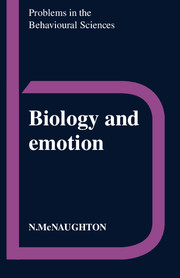Book contents
- Frontmatter
- Contents
- Preface
- Acknowledgements
- 1 Emotion since Darwin
- 2 Releasers and state-dependent reflexes
- 3 Purpose and emotion
- 4 Expression: a window on the emotions?
- 5 Are physiological changes epiphenomena of emotion?
- 6 Somatic influences on the emotions
- 7 Optimal foraging and the partial reinforcement effect: a model for the teleonomy of feelings?
- 8 Do emotions mature or differentiate?
- 9 Cognition, learning and emotion
- 10 Interaction of the components of emotion
- 11 Of mice and men
- 12 Biology and emotion: some conclusions
- Glossary
- Notes
- References
- Index
8 - Do emotions mature or differentiate?
Published online by Cambridge University Press: 05 August 2012
- Frontmatter
- Contents
- Preface
- Acknowledgements
- 1 Emotion since Darwin
- 2 Releasers and state-dependent reflexes
- 3 Purpose and emotion
- 4 Expression: a window on the emotions?
- 5 Are physiological changes epiphenomena of emotion?
- 6 Somatic influences on the emotions
- 7 Optimal foraging and the partial reinforcement effect: a model for the teleonomy of feelings?
- 8 Do emotions mature or differentiate?
- 9 Cognition, learning and emotion
- 10 Interaction of the components of emotion
- 11 Of mice and men
- 12 Biology and emotion: some conclusions
- Glossary
- Notes
- References
- Index
Summary
Train up a child in the way that he should go:
and when he is old, he will not depart from it.
Proverbs, XXII, 6Teleonomy and procreation
In the previous chapters we have treated emotions as if their exact form were fixed genetically and only minor variations would occur as a result of differing experience in different individuals. We have also considered emotions for which teleonomy can be largely assessed in terms of the survival of the individual (which is then taken to imply an increased probability of reproductive success). The present chapter departs from both of these approaches. While individual survival is necessary it is not sufficient for positive selection pressure. As has been argued in a particularly elegant form by Dawkins (1978), what is really critical is the survival of the genes which code for any particular phylogenetic characteristic. Such survival is highly dependent in higher organisms on successful parent–infant interactions.
The major emotion associated with such interactions in most people's minds would be love (Note 8.1). However, in addition to this there must be an important contribution to the infant's well-being from the fact that parents will be the main, and usually sole, source of virtually all of its homeostatic needs. We might presume from this that the neonate would be supplied with a variety of innate responses which would tend to elicit appropriate behaviour or sustenance from the parents.
- Type
- Chapter
- Information
- Biology and Emotion , pp. 93 - 104Publisher: Cambridge University PressPrint publication year: 1989



